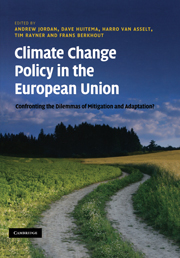Book contents
- Frontmatter
- Contents
- Foreword
- Preface
- List of contributors
- List of abbreviations
- Part I Introduction and overview
- Part II The evolving governance context: the European Union
- Part III Climate policy in the European Union: understanding the past
- 4 Burden sharing: distributing burdens orsharing efforts?
- 5 Renewable energies: a continuing balancing act?
- 6 Emissions trading: the enthusiastic adoption of an ‘alien’ instrument?
- 7 Adapting to a changing climate: an emerging European Union policy?
- 8 Adaptation in the water sector: will mainstreaming be sufficient?
- 9 The evolution of climate change policy in the European Union: a synthesis
- Part IV Climate policy in the European Union: future challenges
- Part V Climate policy in the European Union: retrospect and prospect
- Index
- References
8 - Adaptation in the water sector: will mainstreaming be sufficient?
Published online by Cambridge University Press: 05 August 2011
- Frontmatter
- Contents
- Foreword
- Preface
- List of contributors
- List of abbreviations
- Part I Introduction and overview
- Part II The evolving governance context: the European Union
- Part III Climate policy in the European Union: understanding the past
- 4 Burden sharing: distributing burdens orsharing efforts?
- 5 Renewable energies: a continuing balancing act?
- 6 Emissions trading: the enthusiastic adoption of an ‘alien’ instrument?
- 7 Adapting to a changing climate: an emerging European Union policy?
- 8 Adaptation in the water sector: will mainstreaming be sufficient?
- 9 The evolution of climate change policy in the European Union: a synthesis
- Part IV Climate policy in the European Union: future challenges
- Part V Climate policy in the European Union: retrospect and prospect
- Index
- References
Summary
Introduction
The previous chapter highlighted the concept of mainstreaming and its emerging importance in EU adaptation policy. In this chapter, the implications of this agenda for a specific policy sector – water – are examined. In spite of its economic roots, the EU has in fact been confronting issues associated with the governance of water for over three decades. In fact, water quality constituted one of the very first priorities identified by EU environmental policy makers. In common with some of the other policy areas we have examined, the European Commission has been somewhat handicapped by the lack of a clear legal mandate to regulate. At first, this was partially resolved by framing water quality problems as threats to the common market and/or public health, which gave rise to a somewhat uneven pattern of intervention. In the late 1990s and early 2000s, however, the increased competence of the EU in environmental matters permitted a thorough overhaul of the water acquis, from which emerged a new approach, pursued through the Water Framework Directive (2000/60/EC) and separate legislation on floods (Directive 2007/60/EC). At the time that the water acquis was rapidly developing, climate change was not a prominent concern at EU level. In fact it was only with the creation of the ECCP II in 2005 (see Chapter 7) that the implications of climate change began to be seriously explored by EU water experts.
- Type
- Chapter
- Information
- Climate Change Policy in the European UnionConfronting the Dilemmas of Mitigation and Adaptation?, pp. 167 - 185Publisher: Cambridge University PressPrint publication year: 2010
References
- 3
- Cited by



